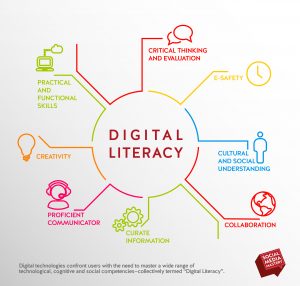
This week we are talking about the “nine elements to digital literacy” as discussed in this article: https://www.digitalcitizenship.net/nine-elements.html
Also, we are discussing the ways in which we can incorporate this type of skill into the SK curriculum, to create a safer online experience for our students.
- Digital Access
This pertains to access to technology and online resources for students. Not every student has financial or physical access to a laptop, iPhone, or tablet, and this needs to be a central understanding of the classroom. The school must be able to provide students with the technological resources to accomplish assignments and become more literate and competent in how society is shaped by technology. Each classroom should give time and access to a computer without the expectancy of students being able to access such resources at home, or else give a way for students to access technology and the web.
2. Digital Commerce
Everything is transferring to online commerce. I know I complete a lot of my shopping online because I love the convenience. There are also a lot of services today that are only offered on the web. We want to be able to access online opportunities, however, it is so important to teach kids how the internet can collect information as well as fake websites and scams that are rampant on the web today. Students should be aware of how to spot scams and websites that for example, “collect cookies”. And they aren’t the yummy kind.
3. Digital Communication and Collaboration
The web is an excellent place to learn and grow together as an online community. Most research is done on the web now, and most social opportunities are executed through many social media platforms. But how can a student have a voice, whilst growing there own learning, without gaining negative repercussions in their offline life? We know how damaging it can be to voice something that can be a danger, whether that is private information or something that can be held against a person that was not aware of the negative implications. Also, becoming aware of the cyberbullying that is ever-so present on our online communication platforms. All of these are vital to the online education of students.
4. Digital Etiquette
Removing the false idea that there is not a human behind the screen you are looking at. The web, though it may be impersonal, is very much personal. When one chooses to interact online, having an understanding of being humane and empathetic to those around you, will continue to promote a safe and positive online community.
5. Digital Fluency
How do we know what we know, as it it legitimate regarding the web. Students need to understand spotting fake news, trolls, and how their is a certain level of respect that should be understood engaging with others. The web has soooo much information, and how can one research and build their learning base, while being a positive addition to the web.
6. Digital Health and Welfare
Screen time. Its A LOT. students need to understand how to organize their day with a healthy balance of physicality and internet presence. Their are many negative effects of being on screen and online all the time. in-person Social deprivation, becoming impersonal, not exercising, can effect your eyesight, can make one have a negative expectation of their own life while viewing others.
7. Digital Law
The web has strict laws as does the real world. If these laws are not adhered to this can result in imprisonment. Students should understand these digital laws, and know the resources that are readily available to them should they fall victim to any of those laws.
8. Digital Rights and Responsibility
Reiterating the importance of the freedom of access and of participation of online activities, however, awareness that the boundary between online and real life is not as secure as one thinks.
9. Digital Security and Privacy
Protect your information, and protect against viruses. Many have freedom of access to the web, and many of those people are not looking out for the best interest of other online pupils. How can students create a secure and private place for them to browse online.
Cheers!